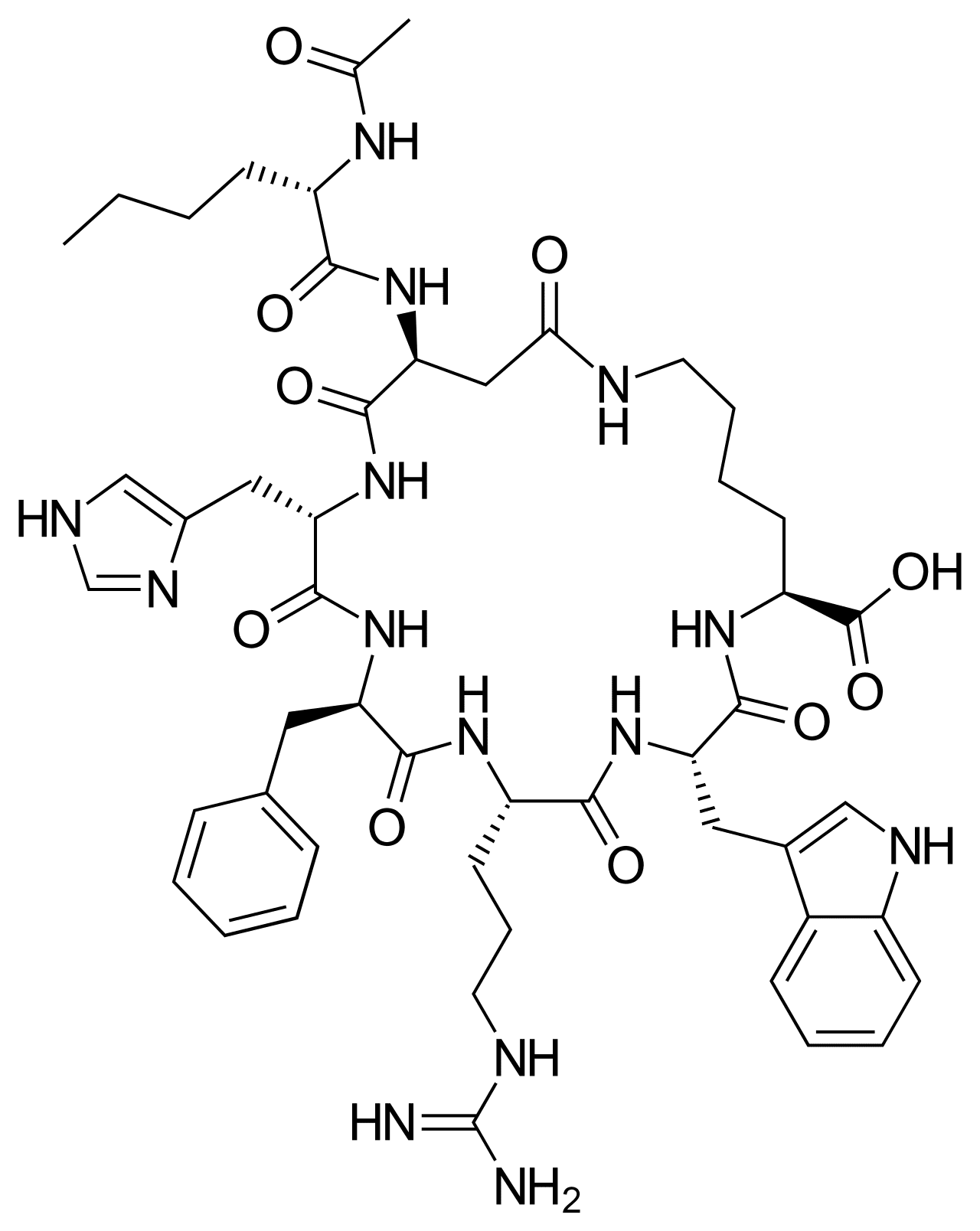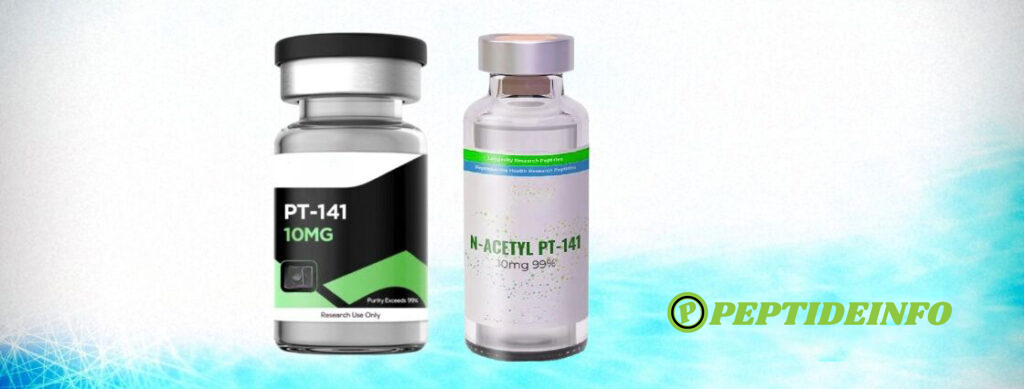PT-141 (bremelanotide) is an FDA-approved treatment of low sexual desire in women, and is also known to treat sexual arousal disorder in male researchers.

PT-141, also known as bremelanotide, is an FDA-approved treatment of hypoactive sexual desire disorder (HSDD) in women [1]. It is a modified synthetic derivative of alpha-melanocyte-stimulating hormone (α-MSH), a peptide of the melanocortin family that regulates skin pigmentation, feeding behavior, and sexual activity, among its other functions.
Back in the 1960s, researchers found that α-MSH caused caused sexual arousal when administered to rats, which eventually led to the development of α-MSH analogues like PT-141, melanotan I, and melanotan II.
In 2019, bremelanotide (PT-141) was approved in the United States as a therapy for premenopausal women with HSDD [2], and it is currently available under the brand name Vyleesi in auto-injection pens [3]. The manufacture and commercialization of Vyleesi in the United States are conducted by Palatin Technologies, the company that originally developed the drug [4, 5].
In addition to its role in treating HSDD in women, PT-141 has been extensively studied in a variety of contexts, including for its roles in treating erectile dysfunction (ED) and other forms of sexual dysfunction.

As an analogue of α-MSH, PT-141 acts on the melanocortin receptors (MCRs), which are found predominantly in the skin and central nervous system and cause an increase in pigmentation by activating melanocytes. However, MCRs are also associated with effects on sexual desire and appetite. PT-141 strongly engages MC1R, MC3R, and MC4R, the latter of which plays a role in modulating sexual desire [2].
Following a subcutaneous injection of PT-141, maximal levels occur after about one hour, with a range of 30 minutes to one hour [6]. In the realm of male sexual desire, this translates to a virtually on-demand erection.
PT-141 that is sold online is generally available only to qualified researchers and is not intended for human testing. However, since PT-141 is another name for the FDA-approved drug bremelanotide, the documented benefits and applications of bremelanotide are identical to those of PT-141:
Potential treatment of erectile dysfunction: While PT-141 is not indicated to treat erectile dysfunction (ED), several small-scale studies have found that it may be beneficial to male patients with ED who do not respond to sildenafil (Viagra).
A 2003 phase 1 randomized double-blind placebo-controlled trial involving 24 healthy male subjects without erectile dysfunction found that test subjects who received intranasal doses of PT-141 (4 to 20 mg) experienced “significantly increased duration of rigid erections of 140 minutes compared to 22 minutes in the placebo group” [6].
A 2004 study involving fewer than 400 patients found that doses of 1mg of PT-141 (bremelanotide) could produce a statistically significant “erectile response” [7].
Based on the above results, the safety and efficacy of PT-141 in test subjects with mild to moderate ED were investigated in a phase II study. Results showed a 3-fold increase in erectile activity following 20mg intranasal administration of PT-141 [8].
A 2008 study involving intranasal bremelanotide spray found that it could help men achieve an erection suitable for penetrative sex when administered 45 minutes prior to intercourse [9].
These findings suggest that PT-141 may act as an alternative ED treatment for subjects who do not respond to sildenafil, a potentiality that merits further research.
Treatment of HSDD in premenopausal women: As we have mentioned, bremelanotide is an FDA-approved treatment of low sexual desire in premenopausal women [4, 5].
While female sexual desire is not yet fully understood, evidence suggests that estradiol, testosterone, dopamine, norepinephrine, and serotonin all play a role.
PT-141 activates presynaptic MC4Rs on neurons and increases the amount of dopamine released [10]. Leading up to its approval, research on bremelanotide showed that premenopausal women with sexual dysfunction who were administered the peptide experienced more sexually satisfying events [11] and had less intercourse-related distress compared to placebo [12, 13].
General sexual dysfunction treatment: According to King et al., melanocortin agonists like PT-141 have “possible applications to the unmet medical needs of decreased sexual motivation and loss of libido” [14]. The authors cited the Molinoff (2003) study, where PT-141 was found to increase the rigidity of erections in test subjects with and without ED [6]. PT-141’s ability to trigger sexual desire in both men and women, independent of sexual stimulation, suggests that it holds potential as a treatment for a variety of sexual desire disorders.
At the recommended dose of 1.75 mg, bremelanotide may produce the following common side effects [2]:
Uncommon adverse reactions include [2]:
Due to the risk of the peptide causing an increase in blood pressure and reduction in heart rate, it should not be administered to subjects who are [16]:
In rare instances, PT-141 may lead to elevated serum enzyme levels, and in even rarer cases, cause acute liver damage [2].
When administered as a treatment of low sexual desire in women, bremelanotide has a favorable safety profile, having completed phase 3 clinical trials prior its being approved for use in the United States in 2019 [15].
In the field of male sexual desire, preliminary trials have established both the safety and efficacy of PT-141, showing that it is a potent initiator of erection with minimal side effects [14]. It must be reiterated that PT-141 is not approved to treat male sexual dysfunction at this time, and that PT-141 sold online is generally available for educational or scientific research only.
As a treatment of low sexual desire in women, bremelanotide is typically administered subcutaneously via self-injection. The most common dosage is 1.75 mg, roughly 45 minutes prior to anticipated sexual activity [2]. Patients with HSDD who are prescribed bremelanotide are advised to self-administer it no more than once per day, for a maximum of 8 times per month [13]. Those who experience adverse reactions to bremelanotide can reduce the dosage. Research has shown that doses of just 1.25 mg can still produce an effective response [11].
Studies involving male subjects with or without ED have tested subcutaneous injections of PT-141 ranging from 1 to 10 mg, showing that PT-141 can produce statistically significant results at doses exceeding 1 mg [7] and dose-dependent improvements in erectile function at doses up to 20 mg [14]. Research suggests a starting dose of 1 mg as a treatment of erectile dysfunction.
Researchers interested in sexual health may be curious about where to buy PT-141 online.
Having tested multiple online peptide vendors and ranked them based on factors like peptide quality, shipping times, and customer support, here is our preferred PT-141 source:
Research Peptide is the premier source of research-grade PT-141 at reasonable prices, and we recommend them for their:
Not only that, but Research Peptide also offers a unique and powerful PT-141 nasal spray that is research-grade.
Furthermore, this research peptides vendor offers great pricing. This is compounded by them offering Peptideinfo.net an impressive 10% off the next order for all qualified researchers.
Just click the button below and add this code:
Experts advise that proper peptide handling requires a standard set of lab supplies.
To correctly reconstitute, administer, and store PT-141, your lab should be equipped with sterile vials, insulin needs, and bacteriostatic water, among other required tools.
Don’t let the hassle of gathering all the necessary supplies put a damper on the research!
While it can be time-intensive, these are some of the lab suppliers and materials every researcher will require:
PT-141, when sold as a research chemical, typically comes in the form of powder that must be reconstituted using bacteriostatic or sterile water.
After being reconstituted, PT-141 is administered subcutaneously. PT-141 is also available as a nasal spray.
PT-141 should be reconstituted with bacteriostatic or sterile water. To reconstitute PT-141, drip the bacteriostatic or sterile water down the side of the PT-141 vial. Let the solution dissolve on its own.
Yes, bremelanotide (PT-141) is a legal, FDA-approved treatment. Women in need of a bremelanotide prescription for low sexual desire should consult with their healthcare provider. Otherwise, qualified researchers may legally purchase PT-141 online as a reference material for research purposes.
No. Bremelanotide (PT-141) is an FDA-approved treatment and has undergone extensive studies that demonstrate its long-term safety and efficacy. PT-141 administration is associated with minimal side effects, and severe adverse reactions are extremely rare.
Yes, research indicates that PT-141 is highly effective at treating a range of sexual desire disorders. The peptide was approved for use in the United States in 2019.
No, PT-141 is not an anabolic-androgenic steroid. It is a peptide analogue of α-melanocyte-stimulating hormone.
No, the research to date does not indicate that PT-141 plays any role in boosting testosterone production.
No, the research to date does not indicate that PT-141 plays any role in building muscle.
No, the research to date does not indicate that PT-141 is associated with weight gain.
PT-141 is a research peptide that has been clinically proven to increase sexual desire in both animal and human studies.
With a favorable safety profile, bremelanotide (PT-141) is indicated to treat low sexual desire in women in the United States. PT-141 has also been extensively tested, with promising results, as a potential treatment of erectile dysfunction.
Researchers looking to further study PT-141 are strongly encouraged to consider our top-rated supplier — a reliable, trustworthy vendor that ships research-grade PT-141 worldwide.

Disclaimer: Peptideinfo.net contains information about products that are intended for laboratory and research use only, unless otherwise explicitly stated. This information, including any referenced scientific or clinical research, is made available for educational purposes only. Peptideinfo.net makes every effort to ensure that any information it shares complies with national and international standards for clinical trial information and is committed to the timely disclosure of the design and results of all interventional clinical studies for innovative treatments publicly available or that may be made available. However, research is not considered conclusive. Peptideinfo.net makes no claims that any products referenced can cure, treat or prevent any conditions, including any conditions referenced on its website or in print materials.
To the extent that Peptideinfo.net references a product that is also a prescription medication, Peptideinfo.net does not does not offer medical diagnosis or treatment advice. The contents of Peptideinfo.net are intended exclusively for qualified researchers. Any individual seeking any advice on any prescription medication, or any disease or condition, is advised to refrain from using this site and consult their healthcare provider. Statements regarding products presented on Peptideinfo.net are the opinions of the individuals making them and are not necessarily the same as those of Peptideinfo.net.
Your access to Peptideinfo.net is subject to our terms of use.